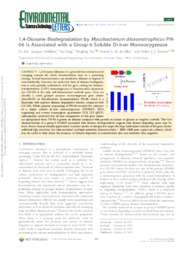Dioxane biodegradation by mycobacterium dioxanotrophicus pH-06 is associated with a group-6 soluble di-iron monooxygenase.
Dioxane biodegradation by mycobacterium dioxanotrophicus pH-06 is associated with a group-6 soluble di-iron monooxygenase.
Autoria: HE, Y.; MATHIEU, J.; YANG, Y.; YU, P.; SILVA, M. L. B. da; ALVAREZ, P. J. J.
Resumo: ABSTRACT: 1,4-Dioxane (dioxane) is a groundwater contaminant of emerging concern for which bioremediation may be a promising strategy. Several bacterial strains can metabolize dioxane or degrade it cometabolically. However, the molecular basis of dioxane biodegradation is only partially understood, and the gene coding for dioxane/ tetrahydrofuran (THF) monooxygenase in Pseudonocardia dioxanivorans CB1190 is the only well-characterized catabolic gene. Here, we identify a novel group-6 propane monooxygenase gene cluster (prmABCD) in Mycobacterium dioxanotrophicus PH-06, which is a bacterium with superior dioxane degradation kinetics compared with CB1190. Whole genome sequencing of PH-06 revealed the existence of a single soluble di-iron monooxygenase (SDIMO). RNA sequencing and reverse transcription quantitative PCR (RT-qPCR) subsequently confirmed that all four components of this gene cluster are upregulated when PH-06 is grown on dioxane compared with growth on acetate or glucose as negative controls. This first characterization of a group-6 SDIMO associated with dioxane biodegradation suggests that dioxane-degrading genes may be more diverse than previously appreciated. A primer/probe set designed to target the large hydroxylase subunit of this gene cluster exhibited high selectivity (no false positives) and high sensitivity (detection limit = 3000−4000 gene copies/mL culture), which may be useful to help assess the presence of dioxane degraders at contaminated sites and minimize false negatives.
Ano de publicação: 2017
Tipo de publicação: Artigo de periódico
Unidade: Embrapa Suínos e Aves
Palavras-chave: Biodegradação de dioxano, Microbactéria
Observações
1 - Por padrão são exibidas publicações dos últimos 20 anos. Para encontrar publicações mais antigas, configure o filtro ano de publicação, colocando o ano a partir do qual você deseja encontrar publicações. O filtro está na coluna da esquerda na busca acima.
2 - Para ler algumas publicações da Embrapa (apenas as que estão em formato ePub), é necessário ter, no celular ou computador, um desses softwares gratuitos. Sistemas Android: Google Play Livros; IOS: iBooks; Windows e Linux: software Calibre.
Acesse outras publicações
Acesse a Base de Dados da Pesquisa Agropecuária (BDPA) para consultar o acervo completo das bibliotecas da Embrapa.

